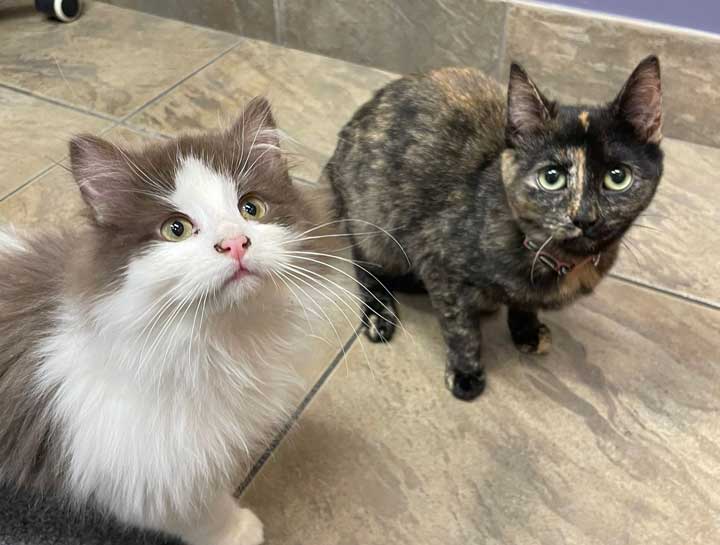Cat Vaccines
When considering vaccinations for your cat, it may seem obvious that outdoor cats will have a higher risk of exposure to infectious diseases and will need additional protection. Many cat owners, however, may wonder why they need to give vaccines to their indoor cats.
Here are some good reasons why you want to ensure your indoor cat is protected:
- You may bring home a kitty addition to your cat's family. Let’s be honest, these are not always planned!
- Your indoor cat may escape to the outdoors.
- You may decide down the road that your indoor cat will become an indoor/outdoor cat.
- Viruses, such as Feline panleukopenia, can be transmitted on fomites (clothing, shoes, hands.)
- A wild animal, such as a raccoon or bat, may get in your house causing concern for Rabies exposure.
Rabies vaccination for our pets is required by law for good reason. Although rabies is rare, it is zoonotic (can be transmitted to people). Infection is always fatal in unvaccinated animals and may be fatal in humans. Vaccination for our pets is a very effective and easy way to prevent many diseases, including rabies.
We understand that our clients need to weigh the risks and benefits when choosing vaccinations. Potential concerns following vaccination include a slight fever, lethargy, anorexia, soreness at the injection site, and, very rarely, an allergic vaccine reaction or vaccine site-associated tumors. Adjuvants, contained in many vaccines are used to enhance the body’s immune response but can, unfortunately, cause some of these negative side effects.
Our vaccines are free of adjuvants and are a smaller volume, which our cat patients appreciate. We always review lifestyles with our clients to decide which vaccines will be required to keep their cats safe. Let’s look at the infectious diseases we recommend all our patients are protected against in their core vaccines, Feline Viral Rhinotracheitis, Calicivirus, Panleukopenia (FVRCP), and Rabies:
- Feline Rhinotracheitis Virus: a virus that affects the upper respiratory tract and is transmitted by oral, nasal, and ocular secretions. Young cats are most often affected but cats of any age are at risk. Signs include sneezing, coughing, anorexia, and nasal/eye discharge.
- Feline Calicivirus: a virus that is highly contagious and affects the upper respiratory tract and is transmitted by oral, nasal, and ocular secretions. Young and old cats are more likely to experience severe symptoms. Infection of pregnant cats can cause abortion. Signs include sneezing, congestion, fever, anorexia, and drooling from oral lesions (ulcers). There are more virulent strains that may cause death.
- Feline Panleukopenia Virus: a virus that infects non-domesticated cat family, raccoons, and members of the weasel family. It is highly infectious and typically seen in kittens and young cats. It causes vomiting, diarrhea, fever, depression, and lethargy. Infection can be fatal.
- Rabies Virus: a virus that is transmitted by a bite from an infected animal such as raccoons, skunks, foxes, and bats. It affects the brain and central nervous system. Signs include fever, seizures, paralysis, change in behaviour, coordination, and salivation. Rabies is always fatal in an unvaccinated animal and is zoonotic to humans. If an unvaccinated animal is exposed to a potentially rabid animal, they must be quarantined to watch for symptoms. There is no test for rabies.
An optional non-core vaccination for indoor/outdoor cats is the Feline Leukemia Virus. This virus is shed in the urine, feces, and milk of infected cats. It can be transmitted during grooming, sharing bowls, bite wounds, and during pregnancy. In the early stage of infection there usually are very few clinical signs but, over time, the virus affects the immune system and can cause cancers and blood disorders. Signs can be vague and wax and wane.
The vaccine appointment has another invaluable aspect that we can’t over-emphasize - the physical check-up. A study was done that surveyed pet owners and found that, even though there are 25 percent more cats owned compared to dogs, only 40 percent of the appointments at veterinary clinics are for cats (World of Feline Resistance). This highlights that cats are generally not seen by a veterinarian until they are quite sick.
Cats are experts at hiding signs of illnesses - Our doctors ask very specific questions and complete a thorough physical exam to detect issues that an owner may not be aware of. For example, baldness of the belly caused by excessive licking may be associated with bladder discomfort and affected pets may be at risk of an emergency urinary blockage. Cat owners may not know that their pet has a painful broken tooth, which is at risk of developing an abscess. Many cat owners report that their pet is frequently trying to bring up a hairball and may mistake this as a normal feline issue, however, the behavior may actually be a cough commonly seen with feline asthma. Regardless of the choice surrounding vaccines, a regular check-up is vital to the health of your cat.

